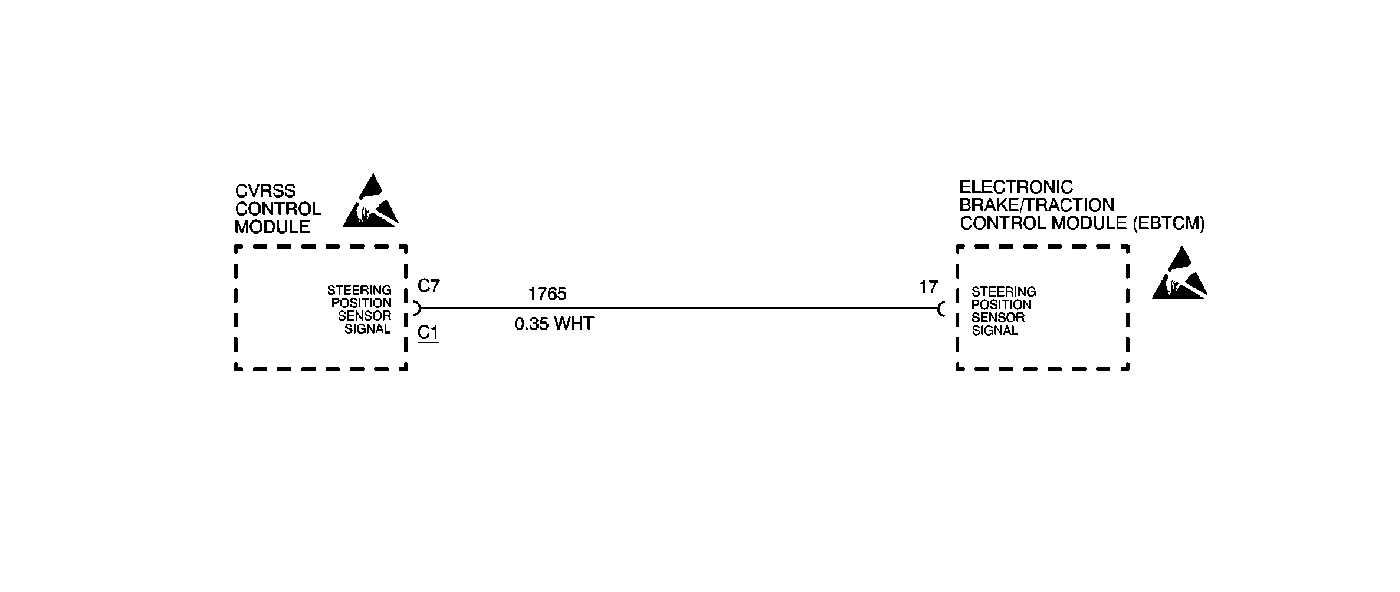Circuit Description

The CVRSS module receives a PWM steering position signal from the EBTCM on circuit 1765. The CVRSS module monitors the PWM steering position circuit to determine if a valid signal is sent from the EBTCM.
Conditions for Setting the DTC
| • | The CVRSS module does not detect a valid steering position signal from the EBTCM. |
| • | The condition must be detected for 5.0 seconds. |
Action Taken When the DTC Sets
| • | DTC C1780 is stored in the CVRSS module memory. |
| • | The CVRSS module ignores the steering position signal input. |
| • | The CVRSS module continues to control the shock absorbers using the lateral acceleration data sent from the EBTCM on the serial data line. |
| • | The SERVICE RIDE CONTROL message is displayed. |
Conditions for Clearing the MIL/DTC
| • | The CVRSS module detects a valid steering position signal from the EBTCM. |
| • | A history DTC will clear after 30 consecutive ignition cycles if the condition for the malfunction is no longer present. |
| • | The IPC clearing DTCs feature. |
| • | Using a scan tool. |
Diagnostic Aids
| • | The following conditions may cause an intermittent malfunction: |
| • | An intermittent open circuit condition on the steering position sensor circuit 1765. |
| • | A short circuit condition to ground or to voltage in the steering position sensor circuit 1765. |
| • | Intermittent operation of the EBTCM. Refer to Electronic Brake Control Module Replacement . |
| • | If the CVRSS module does not receive a valid steering position signal from the EBTCM, the CVRSS system will still function, but will ignore the steering position signal. The CVRSS system uses lateral acceleration data sent from the EBTCM on the serial data line in order to substitute for a loss of the steering position signal. |
| • | An intermittent open circuit condition, or a short circuit condition to ground or voltage on the steering position sensor circuit may cause a random firm/soft ride condition. |
| • | If the DTC is a history DTC, the problem may be intermittent. Using a scan tool, monitor the steering position sensor circuit while moving the related wiring and connectors. This can often cause the malfunction to appear. |
Test Description
Important:
• Do not backprobe the sensors, actuators, or any sealed connectors. • When all diagnostics and repairs are complete, clear the DTCs
and verify the operation.
The number(s) below refer to the step number(s) on the diagnostic table.
-
This step checks to see if any ABS/DTCs are present.
-
This step checks to if the ESC module is able to receive steering position data from the EBTCM.
-
This step check for an open circuit condition on the steering position signal circuit. This step also checks for a short circuit condition to ground or voltage on the steering position signal circuit.
-
This step check for an intermittent malfunction and requests a thorough inspection of the related steering position sensor circuit wiring and connectors.
Step | Action | Value(s) | Yes | No |
|---|---|---|---|---|
1 | Was the Road Sensing Suspension Diagnostic System Check performed? | -- | Go to Step 2 | |
Check for any stored ABS/TCS DTCs using a scan tool. Are any ABS/TCS DTCs stored? | -- | Go to applicable ABS/TCS diagnostic table | Go to Step 3 | |
Monitor the steering position input using the scan tool while turning the steering wheel. Does the voltage reading change when the steering wheel is turned? | -- | Go to Step 6 | Go to Step 4 | |
Was a open circuit condition or a short circuit condition found? | -- | Go to Step 5 | Go to Step 6 | |
5 | Repair the open circuit condition or the short circuit condition in CKT 1765. Is the repair complete? | -- | -- | |
Check the steering position signal circuit for an intermittent malfunction. Refer to Diagnostic Aids. Was an intermittent malfunction found? | -- | Go to Step 7 | Go to Step 8 | |
7 | Repair the intermittent malfunction in the steering position signal circuit. Is the repair complete? | -- | -- | |
8 |
Does DTC C1780 reset after 5 seconds? | -- | Go to Step 9 | System OK |
9 |
Important: The controller must be calibrated. Is the replacement complete? | -- | Go to Step 10 | -- |
10 |
Are the DTCs cleared? | -- | -- |
